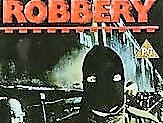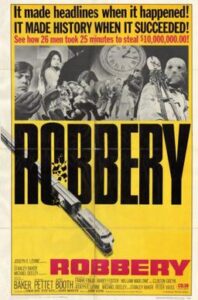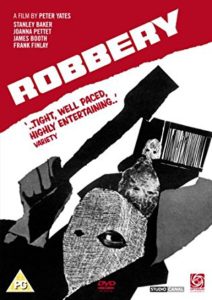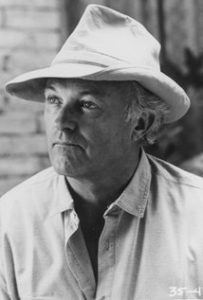Robbery **** (1967, Stanley Baker, James Booth, Frank Finlay, Joanna Pettet, Barry Foster) – Classic Movie Review 5,066
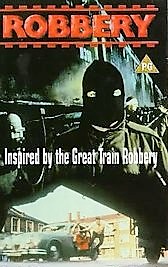
The tremendous 1967 British crime movie Robbery stars Stanley Baker as a tough guy who leads a gang of crooks in a great train robbery on the Glasgow to London overnight mail train.
Director Peter Yates’s tremendous 1967 British crime movie Robbery stars Stanley Baker as tough guy Paul Clifton, who leads a gang of Sixties crooks in a great train robbery on the Glasgow to London overnight mail service, on the Royal Mail train that they relieve of £3 million.
Robbery is a winning, dark-toned caper thriller from director Yates, who thrillingly captures the spirit, atmosphere and details of the real 1963 Great Train Robbery. The nimble, fluent screenplay by Edward Boyd, Peter Yates and George Markstein is based on Peta Fordham’s book The Robber’s Tale, a heavily fictionalised version of the Great Train Robbery. Boyd, Yates and Markstein won the best original British screenplay award from the Writers Guild of Great Britain.
Following an elaborate heist to free a briefcase full of jewellery in London, the grim and determined crime boss Paul Clifton (Stanley Baker) builds up a large fit team to hit a Royal Mail train from Glasgow and constructs a meticulous plan to carry it off seamlessly. But the jewellery getaway heist driver Jack (Clinton Greyn) is identified in a Scotland Yard identity parade and arrested. Next the mob have to spring gang member Robinson (Frank Finlay) from prison. Then there is a crucial disagreement over details on the split of the money and the getaway, and Clifton has reluctantly to agree with the terms dictated by his gang partner Ben (George Sewell). And meanwhile relentless Inspector George Langdon (James Booth) is hot on the trail.
The details in the 25-minute train robbery sequence are taken entirely from court evidence, but the remainder of the film is fictitious speculation to avoid legal problems. Baker said: ‘We had to make sure there was no risk of accidental identification with anyone. The characters involved in the film are in no way based on the characters who took part in the Great Train Robbery.’
Robbery proved a calling card for Yates. Hollywood then called Yates to make Bullitt, which shares the same glee he shows here for tawdry hoods and relentlessly-paced, exciting action, particularly in the brilliant extended high-speed car chase through London at the start of the film. It is quite spectacular, and marvellously well shot and handled.
There’s a dream cast of the era. Both Stanley Baker and James Booth (as the head policeman, Inspector George Langdon, doggedly in the gang’s trail) are absolutely excellent, effectively cast against type. Frank Finlay (as mild-mannered crook Robinson, who is sprung from jail to help clear up the raid, but endangers the whole getaway plan by trying to phone his wife), Joanna Pettet (as the anti-hero’s upset and disillusioned girlfriend Kate Clifton) and Barry Foster (as the anti-hero’s right-hand man Frank) put in especially strong appearances too.
Other essential acting ingredients notably include William Marlowe as gang member Dave Aitken, Clinton Greyn as the ace getaway driver Jack, George Sewell as reluctant gang partner Ben, and Glynn Edwards as the police Squad Chief, all of them inhabiting memorable characters. Johnny Keating’s score is a useful undercurrent for the movie, though it has a few oddly intrusive patches.
Robbery is a top-rate heist movie of its perennially popular kind. Unlike the robbery, everything goes exactly to plan in Peter Yates’s film, and it’s a winner all the way. It’s easy to imagine that Yates identified with the Stanley Baker character of Paul Clifton, the meticulous planner with a fool-proof plan. Yates makes such a great job of this film. He and it are admirable in every way.
Excitingly, the film is shot entirely on location by inspired cinematographer Douglas Slocombe, and contains a great deal of valuable Sixties footage of central London, including Marble Arch, Trafalgar Square, Little Venice and Kensal Green. The robbery was shot to the east of Theddingworth, Leicestershire. Shots of the gang meeting before the robbery were filmed at Leyton Orient Football Club at a match with Swindon Town. The gang’s airfield hideout was filmed at RAF Graveley. Other filming was done at New York Harbor and Arbour Hill Prison in Dublin.
It was shot in early 1967 and premiered in London on 21 September 1967.
The film is produced by Stanley Baker and Michael Deeley, for Baker’s company Oakhurst Productions. Baker was well connected with producer Joseph E Levine, whose Embassy Pictures took over the funding of the movie. This proved a good move as Michael Deeley reported that the film did ‘good business’ in the UK, though it was not a big hit in the US, with Peter Yates complaining that it was ‘very poorly exploited’.
Stanley Baker may be cast against type, but he plays a similar criminal mastermind in the 1962 thriller A Prize of Arms.
Also in the cast are William Marlowe, Clinton Greyn, George Sewell, Glynn Edwards, Martin Wyldeck, Frank Williams, David Pinner, Barry Stanton, Ivor Dean, Robert Powell, Mike Pratt, John Savident and Linda Marlowe.
Robert Powell enjoys his first film role, as the locomotive driver’s assistant. He followed it up with a small role in The Italian Job (1969) playing one of the gang,
Robbery is directed by Peter Yates, runs 114 minutes, is produced by Oakhurst Productions, is released by Paramount British Pictures (UK) and Embassy Pictures (US), is written by Edward Boyd, Peter Yates and George Markstein, based on The Robber’s Tale by Peta Fordham, is shot in Eastmancolor by Douglas Slocombe, is produced by Joseph E Levine, Michael Deeley and Stanley Baker, and is scored by Johnny Keating.
Baker and Booth memorably appeared together in Zulu (1964).
The cast
The cast are Stanley Baker as Paul Clifton, Joanna Pettet as Kate Clifton, James Booth as Inspector George Langdon, Frank Finlay as Robinson, Barry Foster as Frank, William Marlowe as Dave Aitken, Clinton Greyn as getaway driver Jack, George Sewell as Ben, Glynn Edwards as Squad Chief, Michael McStay as Don, Martin Wyldeck as Chief Constable, Rachel Herbert as school teacher, Patrick Jordan as Freddy, Barry Stanton as car lot owner, Kenneth Farrington as Seventh Robber, Ivor Dean as Postal Worker, Robert Powell as the locomotive driver’s assistant, Mike Pratt as Informant at Railway Station, John Savident as Police Constable, and Frank Williams as prison contact.
Check out the top 20 British heist movies:
Peter Yates (1929–2011).
Peter Yates received nominations for four Academy Awards, three BAFTA Awards, and two Golden Globe Awards, with no wins.
© Derek Winnert 2017 Classic Movie Review 5,066
Check out more reviews on http://derekwinnert.com

